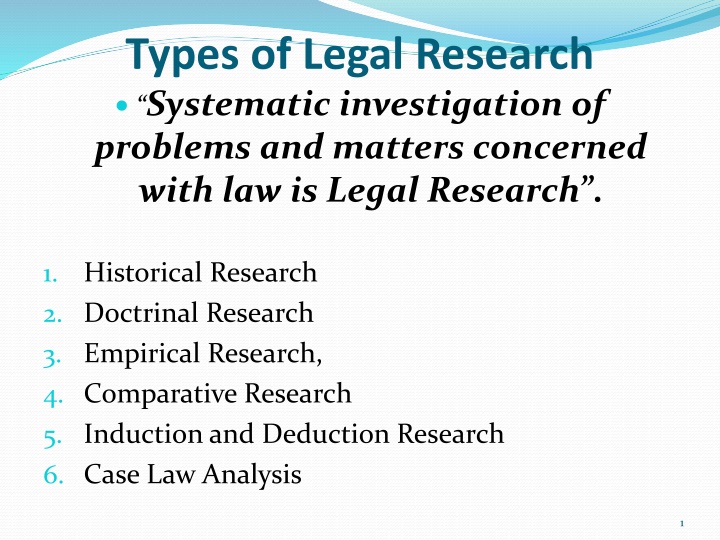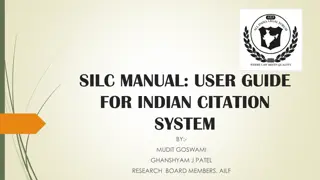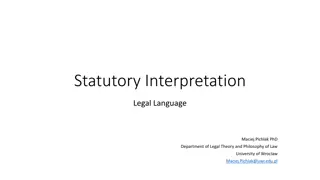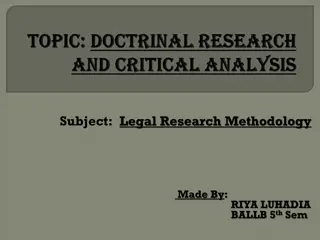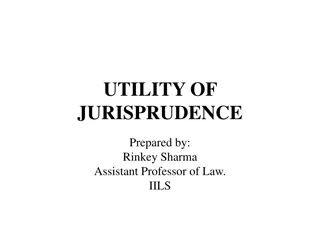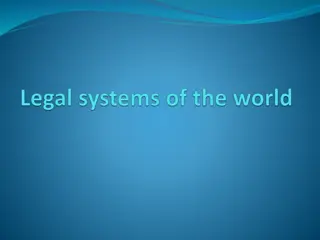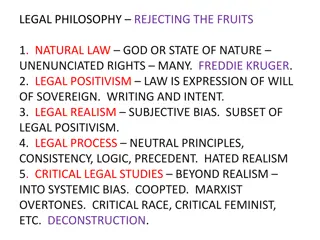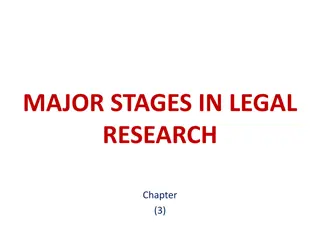Types of Legal Research
Legal research involves systematic investigation into legal issues using methods such as historical analysis, case law study, doctrinal research, and empirical research. Comparative analysis of different legal systems helps in understanding and developing laws. Induction and deduction techniques are also employed in legal research to draw conclusions from concrete evidence. Explore diverse research methodologies in the legal field to enhance legal understanding and decision-making.
Download Presentation

Please find below an Image/Link to download the presentation.
The content on the website is provided AS IS for your information and personal use only. It may not be sold, licensed, or shared on other websites without obtaining consent from the author.If you encounter any issues during the download, it is possible that the publisher has removed the file from their server.
You are allowed to download the files provided on this website for personal or commercial use, subject to the condition that they are used lawfully. All files are the property of their respective owners.
The content on the website is provided AS IS for your information and personal use only. It may not be sold, licensed, or shared on other websites without obtaining consent from the author.
E N D
Presentation Transcript
Types of Legal Research Systematic investigation of problems and matters concerned with law is Legal Research . Historical Research 1. 2. Doctrinal Research 3. Empirical Research, 4. Comparative Research 5. Induction and Deduction Research 6. Case Law Analysis 1
Historical Research Finding out the previous law in order to understand the reasons behind the existing law and the course of its development. Constitutional Debates in the Constituent Assembly, Charter Acts etc. Examples: Formulation of Taxation System in India Through the Colonial Regime. Constitutional Amendments in India: Historical aspects and its Impact on India. The Judicial Review of Administrative Action in India during the British Regime. 2
Doctrinal Research It involves analysis of case law in arranging, ordering and systematizing legal proposition and study of legal institution through legal reasoning or rational deduction . (i) Systematic analysis of Statutory Provisions and of Legal Principles involved therein, or derived there from, and (ii) Logical and Rational ordering of the Legal Propositions and Principles. Examples: Human Rights of Migrants: Challenges and Policies in the New Decade. Foreign Direct Investment in Retail Sector in India: A Critical Analysis. Hate Speech on Social Media and Its Conviction in India under Criminal Legal System. 3
Empirical Research Greek word Empeirikos: means Experienced. Any research where conclusions of the study is strictly drawn from concretely empirical evidence, and therefore verifiable evidence. 1. Quantitative Research: to gather information through Numerical Data. (survey, longitudinal studies, polls) 2. Qualitative Research: to gather Non-Numerical Data. (Focus Groups, Experiments, Interviews etc.) Examples: Efficacy of Domestic Violence Act on Working Women in Reference to Noida Region. Working and Performance of The National Commission for Protection of Child Rights. Conditions of Child labours in Zari factories in Varanasi. 4
Comparative Analysis A Method of Legal Study comparing legal systems with each other. To Compare and Contrast Nations, Traditions, Laws, Cultures, Societies, and Institutions to get a rationale Idea. Beneficial in Legal Development Modification, Amendment and Changes to the law are required. Examples: Juvenile Justice Act 2000 and Juvenile Justice, Care and Protection of Children Act 2015: A Comparative Analysis. Award of Death Sentence for Heinous Crimes in India: A Comparative Study with UAE Laws. A Comparative Analysis of the Protection and Rehabilitation of Acid Violence Victims in India with Reference to Laws in Bangla Desh. Process where 5
Inductive Research It begins with a set of empirical observations, seeking patterns in those observations, and then theorizing about those patterns. It aims atdeveloping a theory. It moves from specific observations to broad generalizations. Example: Observation: Some Police Constables are Corrupt. Observe a Pattern: Speak to the Police department, their colleagues. Observe their system. Develop a Theory: All Police Constables are Corrupt. 7
Deductive Research It begins with a theory, developing hypotheses from that theory, and then collecting and analyzing data to test those hypotheses. It works from the more general to the more specific. Example: Existing Theory: All Police Constables are Corrupt. Formulation of Hypothesis : As they are suppressed by their seniors, they do not have a choice. Data Collection: Primary/Secondary Sources. Result Analysis: Some Police Constables are Corrupt. (Rejection of Theory)or Otherwise. 8
Research Based on Case Laws Case law is the collection of reported cases that form the body of law within a given jurisdiction. Role of Indian judiciary on Protection of the Fundamental Rights with Special Reference to Maneka Gandhi case. Uniform Civil Code: A Critical Analysis in the light of Shah Bano case. Adultery Law in India: A Study with Reference to Joseph Shine Case. Concept and Applicability of Euthanasia in India with Reference to Aruna Shanbuag Case. Traditional Knowledge And Patent Issues: An Overview of Turmeric, Basmati and Neem Cases. Health as a Basic Human Right: In reference to MC Mehta v. Union of India Case. 9
